|
The Foot and the Horse!
|
|
|
THE FIRST OF THE AMES - THE MODEL 1832 (DATED 1832) FOOT ARTILLERY SWORD WAS LAST WEEKS POSTING. THIS WEEK WE LOOK AT THE 1840 MODEL (DATED 1847) HORSE OR LIGHT ARTILLERY SABER
|
|
|
Part Two Of Two The Model 1840 Light Artillery Saber
|
|
|
Nathan P. Ames, Jr. secured his first contract for the Model 1840
Light (Horse) on August 26, 1844. The contract called for 500 of
what the Ordnance Department referred to as "Horse Artillery" swords.
They were delivered on August 29, 1845. Until the start of the Civil
War, Ames was the only U.S. manufacturer of this sword. During the
Civil War several other contractors also produced this model sword
for the for the U.S. Government. Ames continued to produce these
swords through the war with the final delivery of 2,000 being made
on April 29, 1865. During the span of 19 years and 8 months or so,
Ames manufactured 24,602 of the Model 1840 Light (Horse) artillery
sabers. A very functional and good looking weapon, it remained regulation
for the light artillery for approximately 50 years.
|
|
|
|
|
|
|
|

OBVERSE VIEW OF MODEL 1840 LIGHT ARTILLERY SABER WITH SCABBARD
|
|
|
This saber, the first of two variations by Ames, was patterned directly
from the French Model of 1829. There was no reinforced scabbard
throat as the top of the scabbard body fitted directly into a raised
casting at the bottom of the brass guard. This allowed the scabbard
body to fit into the recessed guard casting when the saber was returned
to the scabbard. This variation lasted until 1860. The second variation,
on swords dated between 1861 and 1865, had the conventional reinforced
scabbard throat with a collar. Having no scabbard recess, these
swords are flat at the bottom of the brass guard. Due to a production
overlap, it is possible that some 1861 dated swords, may be found
with the recess in the bottom of the guard.
|
|
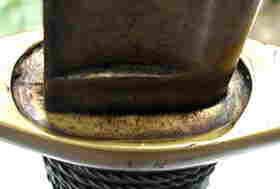
|
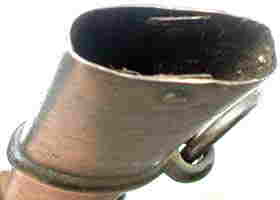
|
|
|
|
|
The 1847 dated Ames artillery saber featured here has a single-edged
curved blade 31-3/4" in length that is 1-1/4" wide and 5/16" thick
at the hilt. It has only a rudimentary false edge. There is a broad
fuller that extends approximately 25" from the ricasso to within
6-1/2" of the point. There is no visible stamping or even a hint
of one on the obverse ricasso of the blade. The reverse ricasso
is poorly stamped "N. P. (?AMES?)" over "CABOT(?VILLE?)" over
"1847". On the very reverse lip of the pommel cap are the inspector's
initials of "JWR". They stand for James W. Reilly, Major, USA. The
only other marking on this sword is a "45" stamped in the center
of the obverse cross guard. The grip is wood covered by black leather
and wound with twisted brass wire. The brass pommel is of a Phrygian
helmet pattern. The brass one piece four-sided knuckle bow
and cross guard curves evenly above the blade and across it with
the quillon curving downward and terminating in a round disc. The
iron scabbard has two suspension rings and a drag. The scabbard
has faded traces of a gold floral design on it's body and drag.
It was probably used by an artillery officer.
|
|

BLADE TIP/FALSE EDGE
|
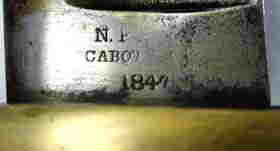
"N.P. (?AMES)CABOT(?VILLE?)1847"
|
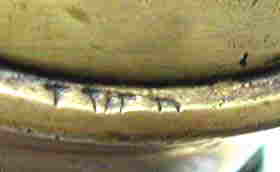
"JWR" STAMPING - POMMEL LIP
|
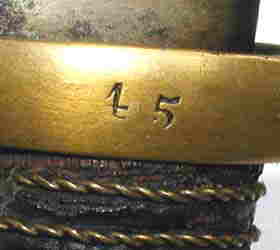
"45" STAMPING - CROSS GUARD
|
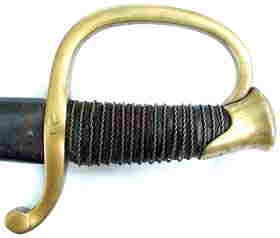
OBVERSE VIEW - HILT
|
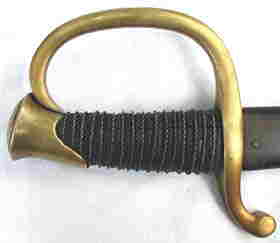
REVERSE VIEW - HILT
|
|
|
|
|
The iron scabbard is 33-3/4" long. The top suspension ring mounting
is 3-3/16" from center to the scabbard mouth. The lower ring mounting
is 8-1/4" on center from the upper mounting. The outside diameter
of the each suspension ring is 1-3/8". The black scabbard has faded
gold floral decorations.
|
|

OVERALL VIEW OF SCABBARD
|
|
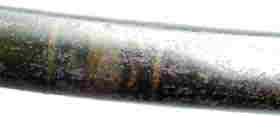 |
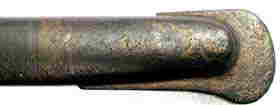 |
| CLOSE
UP OF SCABBARD & DRAG DECORATIONS
|
|
|
|
|
|
Reference credits go to the "COLLECTORS' GUIDE TO AMES U.S. CONTRACT
MILITARY EDGED WEAPONS: 1832 - 1906" by Ron G. Hickox and
"THE AMERICAN SWORD 1775-1945" by Harold L. Peterson.
|
|
|
For more on the Ames Sword Company, you are encouraged to look at
the following web pages:
http://www.amessword.com/body_index.html http://www.manatarmsbooks.com/early.html http://swordcoll.www2.50megs.com/marks/Manufacturers.htm
|
|
|
My son, Reed Radcliffe, is the web master of this page. All credit
for arranging and posting this web page is his. The pictures, write-up,
spelling and grammar errors should be credited to me.
Dave Radcliffe |
|